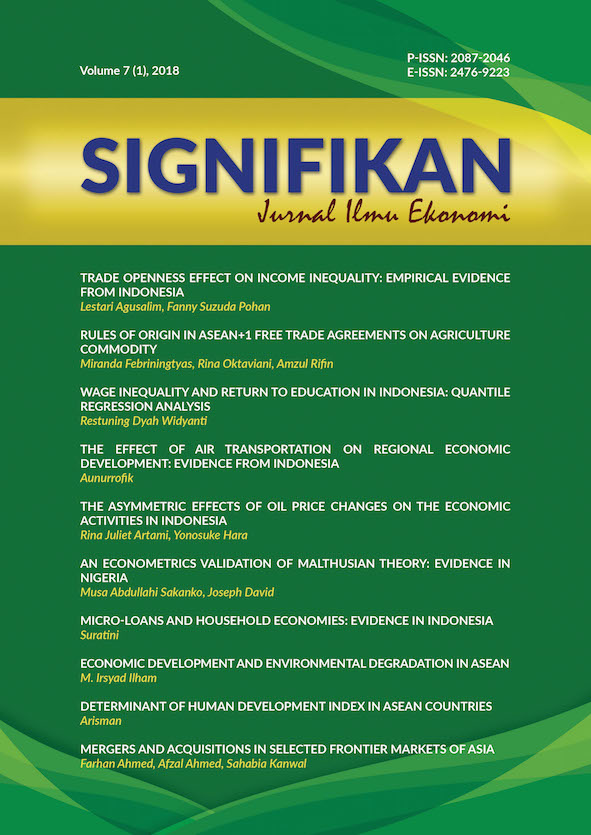An Econometric Validation of Malthusian Theory: Evidence in Nigeria
DOI:
https://doi.org/10.15408/sjie.v7i1.6461Keywords:
Malthusian Theory, Population, Nigeria, ARDL Bound TestingAbstract
Rising population is an asset, provided, the skills of the workforce are used to the maximum extent. If not appropriately channelized, it can be a liability for a nation. A skilled and hardworking population can emerge as a foundation for a country’s development. This study examines the validity of Malthusian Theory in Nigeria using time series data from 1960 to 2016, employs the ARDL bound test techniques. The result shows that in the long-run, population growth and food production move proportionately, while population growth poses a depleting effect on food production in the short-run, thus validating the incidence of Malthusian impact in Nigerian economy in the short-run. The researcher recommended the government should strategize plans, which will further intensify family planning and birth control measure, compulsory western education and revitalization of the agricultural sector.
References
Abdulrahaman, S. (2013). Population Growth and Food Security in Nigeria (2010-2012). Arabian Journal of Business and Management Review (Nigerian Chapter). Vol. 1 (3): 41-63.
Adediran, O.A. (2012). Effect of Population on Economic Development in Nigeria: A Quantitative Assessment. IJPSS, Vol. 2 (5): 1-14.
Ahmad, K. & Ali, A. (2016). Rising Population and Food Insecurity Linkages in Pakistan: Testing Malthusian Population Growth Theory. Munich Personal RePEc Archive (MPRA). Retrieved from https://mpra.ub.uni-muenchen.de/71131/
Aidi, H.O., Emecheta, C. & Ngwudiobu, I.M. (2016). Population and Economic Growth in Nigeria: is there an Empirical Evidence of Causality?. International Journal Advances in Social Science and Humanities. Vol. 4 (2): 59-66.
Ali, S., Alam, K.J., Islam, S. & Hossain, M. (2015). An Empirical Analysis of Population Growth on Economic Development: The Case Study of Bangladesh. International Journal of Economics, Finance and Management Sciences. Vol. 3 (3): 252-259.
Ali, S., Ali, A. & Amin, A. (2013). The Impact of Population Growth on Economic Development in Pakistan. Middle-East Journal of Scientific Research. Vol. 18 (4): 483-491.
Ashinze, A.N. (2015). A Robust Model for The growth of the Nigerian Population. IOSR Journal of Mathematics (IOSR-JM). Volume 11 (6): 65-69
Babatunde, B.O. & Ajayi, S.O. (2010). Food Crisis and Population Growth in Nigeria. Manager Journal. Vol. 11 (1): 180-187.
Chand, S (2017). Malthusian Theory of Population: Criticisms and Applicability. Your Article Library. Retrieved November 29, 2017, from http://www.yourarticlelibrary.com/population/malthusian-theory-of-population- criticisms-and-applicability/10885
Ewugi, M.S. & Yakubu, I. (2012). Malthusian Population theory and the Nigerian Economy: A Political Economy Approach. International Journal of Human Resource Studies. Vol. 2 (4): 197-206
Friedman, P. (2000). Grolier, Encyclopedia of Knowledge. Vol. 15, USA. In Ewugi, M.S. and Yakubu, I. (2012). Malthusian Population theory and the Nigerian Economy: A Political Economy Approach. International Journal of Human Resource Studies. Vol. 2 (4): 197-206
Hanson, J.L. (1971), “A Textbook of Economics”. 5th edition, MacDonald and Evans, London. In Ewugi, M.S. and Yakubu, I. (2012), “Malthusian Population theory and the Nigerian Economy: A Political Economy Approach”. International Journal of Human Resource Studies, Vol. 2, No. 4, pp. 197-206
Harley, R. (2017), “Malthusian Theory of Population Growth: Definition & Overview”. Retrieved November 29, 2017, from http://www.study.com/academy/lesson/ malthusian-theory-of- population-growth-definition-lesson-quiz.html
Musa, A.M. (2015). Econometric Model on Population Growth and Economic Development in India: An Empirical Analysis. Proceedings of the International Symposium on Emerging Trends in Social Science Research (IS15Chennai Symposium), Chennai-India, 3-5 April 2015 Paper ID: C539
Seth, T. (2017). Malthusian Theory of Population: Explained with its Criticism. Retrieved November 29, 2017, from http://www.economicsdiscussion.net/articles/ malthusian- theory-of-population-explained-with-its-criticism/1521
Okoh, A.S., Ojiya, E.A. & Chukwu, S.N. (2017). The Impact of a Growing Population on Agricultural Output in Nigeria: An Empirical Analysis of the Malthusian Hypothesis. Basic Research Journal of Business Management and Accounts. Vol. 6 (1): 38-50.
Okwori, J., Ajegi, S.O., Ochinyabo, S. & Abu, J. (2015). An Empirical Investigation of Malthusian Population Theory in Nigeria. Journal of Emerging Trends in Economics and Management Sciences (JETEMS). Vol. 6 (8): 367-375.
Oladimeji, Y. U. (2017). Food Production Trend in Nigeria and Malthus Theory of Population: Empirical Evidence from Rice Production. Nigerian Journal of Agriculture, Food and Environment. Vol. 13(1): 126-132.
Osu, A.K. (2017). Population Dynamics and Food Security in Nigeria. International Journal of Advanced Studies in Economics and Public Sector Management. Vol. 5, (2): 129 - 139.
Weil, D. N. & Wilde, J. (2010). How Relevant Is Malthus for Economic Development Today?. American Economic Review. Vol. 100, (2): 378 – 382.
Zhang, S. (2015). Analysis of the Correlation between Population Growth and Economic Development in Asian Countries. Cross-Cultural Communication. Vol. 11 (11): 6- 11.


